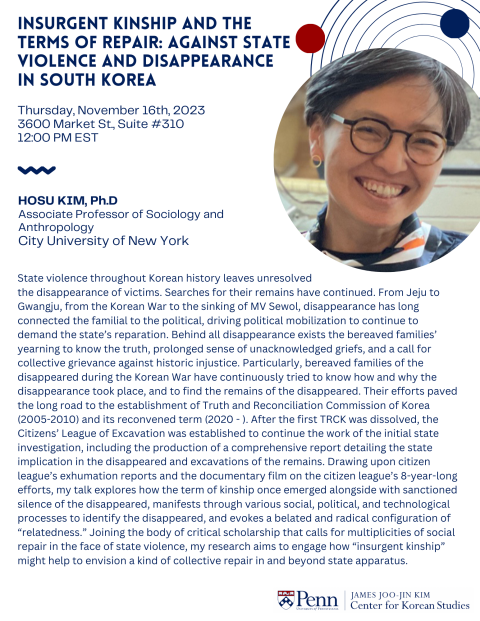
Korean Studies Colloquium
3600 Market Street, Suite 310 Philadelphia, PA 19104
State violence throughout Korean history leaves unresolved the disappearance of victims. Searches for their remains have continued. From Jeju to Gwangju, from the Korean War to the sinking of MV Sewol, disappearance has long connected the familial to the political, driving political mobilization to continue to demand the state’s reparation. Behind all disappearance exists the bereaved families’ yearning to know the truth, prolonged sense of unacknowledged griefs, and a call for collective grievance against historic injustice. Particularly, bereaved families of the disappeared during the Korean War have continuously tried to know how and why the disappearance took place, and to find the remains of the disappeared. Their efforts paved the long road to the establishment of Truth and Reconciliation Commission of Korea (2005-2010) and its reconvened term (2020 - ). After the first TRCK was dissolved, the Citizens’ League of Excavation was established to continue the work of the initial state investigation, including the production of a comprehensive report detailing the state implication in the disappeared and excavations of the remains. Drawing upon citizen league’s exhumation reports and the documentary film on the citizen league’s 8-year-long efforts, my talk explores how the term of kinship once emerged alongside with sanctioned silence of the disappeared, manifests through various social, political, and technological processes to identify the disappeared, and evokes a belated and radical configuration of “relatedness.” Joining the body of critical scholarship that calls for multiplicities of social repair in the face of state violence, my research aims to engage how “insurgent kinship” might help to envision a kind of collective repair in and beyond state apparatus.
Hosu Kim is an Associate Professor of Sociology and Anthropology, Women’s, Gender, and Sexuality Studies at the College of Staten Island and a doctoral faculty of Critical Social Psychology program at the Graduate Center, the City University of New York. Her current project, Crossings to Repair, examines multiple forms of the disappearance at the sites of the state and imperial violence in South Korea and beyond. By employing “missing” as a method, she interrogates epistemological limit of major truth-seeking efforts and explores alternative ethics and politics of repair in more than human world. Her works appear in Body and Society, Adoption and Culture, Scholars and Feminists Online and many others, including 시설사회 and 5.18 과 이후: 발생, 감응, 확장 in Korean. She is also an author of Birth Mothers and Transnational Adoption Practice in South Korea: Virtual Mothering, published by Palgrave-Macmillan in 2016.
 James Joo-Jin Kim Center for Korean Studies
James Joo-Jin Kim Center for Korean Studies